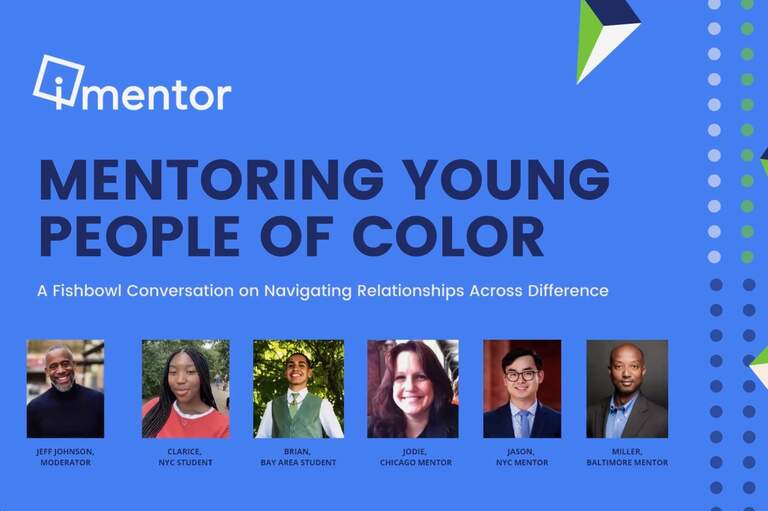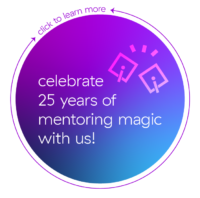More than 600 people tuned in on August 12 to join iMentor’s Mentoring Young People of Color fishbowl conversation, an intimate discussion about building relationships across difference.
Hosted by Jeff Johnson, iMentor Baltimore advisory board chair and CEO of JIJ Impact, the event brought together a dynamic group of mentors and students to share stories, lessons learned, and recent experiences in the mentoring journey:
- Brian Baltazar, Bay Area mentee
- Jason Cheung, NYC mentor
- Clarice Ilboudo, NYC mentee
- Miller Roberts, Baltimore mentor
- Jodie Ulaszek, Chicago mentor
Student Voices
Brian, a first-year student at Harvard College this past academic year, said he was grateful to iMentor for providing support and resources this spring when he had only a few days to leave campus and fly home to the Bay Area as a result of his school closing due to the COVID-19 pandemic. Reflecting on his iMentor experience and on his own pursuit to be a constitutional lawyer, Brian said, “My parents didn’t have anything beyond middle school education. My mom wanted to be a lawyer. I am grateful to have the opportunities that she didn’t have.”
Clarice recently graduated high school and looking forward to attending Howard University this fall. “Growing up at school, I always learned about white history and not my own, and if I did, it was only about slavery,” she said. “When I’m at Howard, I know they’re going to teach me about my history.”
Building A Connection
Mentees and mentors recalled their first impressions upon meeting their other mentoring half—including when there were differences between them and they worked to build a connection. “The people that are least like us are often the ones that we have the ability to learn the most from, because we don’t make as many assumptions,” said Jeff. “We ask more questions and become more open. We try to see the humanity in each other.”
But building a relationship across difference is not so simple. Jeff asked the panelists: How do you have honest conversations? How do you build trust?
Miller, a mentor in Baltimore, remarked that his mentee was the first to bring up trust when their conversation entered into some heavy topics a few months after they met. His mentee paused and said, “Maybe we should stop talking, because I don’t know if I trust you.” When Miller asked what he could do to earn his mentee’s trust, the student responded, “I need to know that you will be there, that you will show up.” Miller said it was a profound realization that summed up what we all want in a relationship.
Jason, a Korean American mentor in NYC paired with a student who recently immigrated from China, shared how he came to have discussions about race with his mentee.
“As COVID happened, people of Asian descent in America experienced discrimination in a way that they weren’t used to. How do I have a conversation about the murder of George Floyd with my mentee who has only had a year of experience in the US and doesn’t have the social context? It was hard for him to understand,” said Jason. “We had an honest conversation about why people are so upset. I shared that there’s connections between what he’s experiencing when he walks outside and feels afraid of being harmed [during the COVID crisis], and the experience of black and indigenous people of color, who have been feeling that for a long time.”
Reflecting on how she supported her mentee during unrest in Chicago, Jodie commented, “In this moment, I’ve had to learn how to be an ally and to unlearn the systems that have contributed to my own bias. What does ‘white savior’ mean? I need to dig deep into that.”
Students offered an array of practical tips on what mentors should and should not do: “Be consistent in communicating.” “Come to events.” “Don’t over talk about school.” “Be comfortable in silence.” “Understand college isn’t for everyone, but there are different paths.” “Be human, have fun.”
Advice for New Mentors
Panelists shared anecdotes and nuggets of wisdom for current mentors and those who are interested in mentoring. For Brian, being part of iMentor enabled him to take a different path than he expected after high school. “My mentality before iMentor, I never thought I could go to an Ivy League college,” said Brian. “iMentor and my mentor gave me the confidence and the idea that I could [have] ambition towards more. Now I’m at Harvard. That is the meaning behind iMentor: giving opportunities for students.”
Jason spoke about how much society needs the talent of young people of color. “I’ve been incredibly inspired hearing from Brian and Clarice. We need them in our companies, we need them in places of leadership. It would be such a shame if small resources – things as simple as a small webcam – would prohibit them from being in the places that we need them to be,” said Jason.
“I challenge mentors to provide financial assistance to iMentor,” he added. “Do whatever you can to chip in so that iMentor can navigate the world of COVID and video conference. Our mentees depend on it.”
Jodie shared that her mentee went to college for the first time earlier that day and asked to video chat to show off her new dorm room. The mentee plans to be an English teacher so that she can help other black and brown students like herself. For Jodie, it is an honor and an adventure to accompany her mentee in her journey to higher education.
Miller gave advice and encouragement to prospective mentors. “This isn’t just about school. It’s a holistic approach about being present with someone,” said Miller. “There is no cookie-cutter mold for a mentor. You just need to show up. Be raw, and it will work. Don’t worry about who you will match with. You have the capability.”
Watch the full video of the event above, read stories about our mentors and mentees, and learn more about becoming a mentor.

